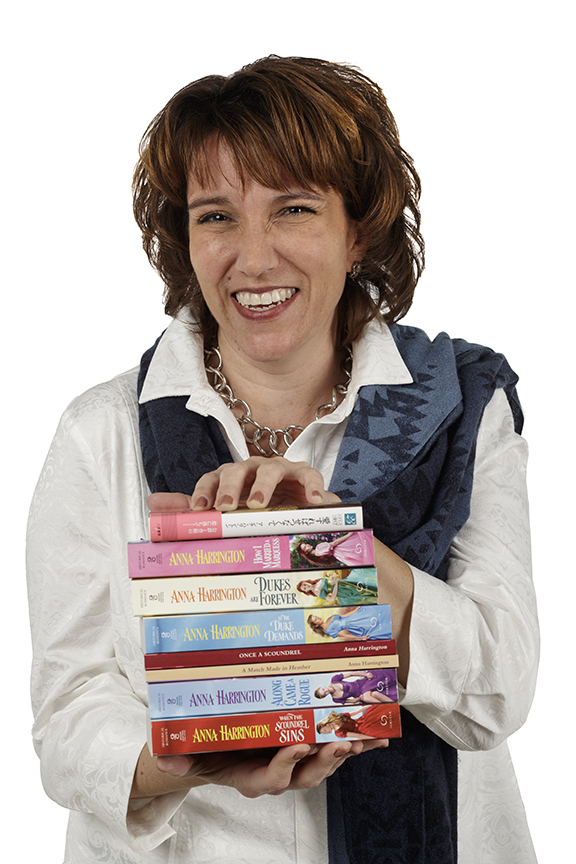Name: Anna Harrington
Age: 47 (Or, as she prefers to describe it, the 22nd anniversary of her 25th birthday.)
Hometown: Macy, Indiana
Occupation: Romance novelist; English professor at Chattanooga State Community College
With her characters' steamy rendezvous scoring a consistent 4 out of 5 on the heat meter, Anna Harrington likes to describe herself as a "spicy" historical romance writer. But it isn't just her talent for keeping readers breathless with anticipation that led USA Today to call her "deliciously diabolical."
Behind each stolen glance and forbidden kiss is a strong plot with even stronger female characters, reviewers agree, and though Harrington's books are set to the backdrop of Great Britain's Regency era (1811-1820), each heroine is more savior than damsel in distress.
As Harrington prepares for the March release of her newest book, "As the Devil Dares," we pulled her away from the character-building and rewriting to find out more about her experience in the industry, the evolving role of women in the genre, and how she's managed to churn out nine novels over the last two years.
» The easy answer [for my productivity] is I don't have a husband or kids, and I only sweep my floor once every three or four months. [laughs]
» To be honest, I know how freaking lucky I am. Very rarely does anybody ever get picked up by a traditional publisher, especially these days.
» I have been writing fiction since I was an early teenager. I wanted to be the person who had their stories taught in high school English classes.
» I've had several short stories published in different literary mags across the country, and I've won some poetry contests - which is just frightening to think that those poems won anything. [laughs]
» Then literally five years ago - I had just moved to Chattanooga - I went to some discount bookstore and picked up a historical romance because it was on sale. I read it and I thought, "I can do this."
» I knew a lot about the Regency time period because the Napoleonic Wars have always fascinated me, and medicine from that time period really fascinates me. So when I started writing historicals, it made sense to set them during that time period.
» There are certain expectations of historical romance. You have to have the "happily ever after." If it's not a happily-ever-after, it's not romance. [Publishers] just won't touch it.
» You also have to describe the clothing, especially in historical romance. Readers want to know every tiny detail about the ball dress that the heroine's wearing. They want to know the color, the cut. Does it have sleeves or not? Are they poofy sleeves or are they straight sleeves? Are her slippers satin? And did you call them shoes or slippers? Because if you called them shoes, shame on you.
» A lot of it's also constricted by history. She's not going to wear red; that was the color of prostitutes. If she's widowed, she's not going to wear pastels. It was the unmarried misses that wore the pastels up to a certain age.
» For men, you would always put them in some sort of white waistcoat. Because white meant they didn't work. If it was pristine white, it meant that they never got dirty, so they had money.
» There are certain areas that I know to look for to know how well the writer knows the time period. And one of them is clothes.
» I get the clothing wrong on purpose at times. It usually involves the sex scenes and being able to get clothes on or off.
» For a woman, at the time, it would not be unusual for her to have five or six layers of clothing on. Do you really want to stop the action and describe her taking off all six layers of clothing? You're talking about clothes that are going to take you somewhere between half and hour to 45 minutes just to put on.
» This is where I say: "But it's not erotica!" It's the emotion behind it. And if you don't have an interesting journey grounded in real emotions and real conflict, the readers are going to know. They're going to feel cheated.
» There is a stigma attached to [romance novels]. Because even just 30, 40 years ago romances were terrible. They were the "heroine falls in love with her rapist" stories.
» [Today], you must have a strong heroine who's independent and able to take care of herself. She has to rescue herself at the end of the book. Also, everything has to be consensual.
» I always tell my editor, "The Cinderella Complex is dead in my books." We all want to be that woman who's confident enough to chase after what she wants in life.
» It used to be that the woman [in a romance novel] was always the secretary. Now, the heroine is running the business. She's the entrepreneur. She's the CEO. She's the doctor, the lawyer. She's the one at the top.
» Even my historical heroines who don't get paid have to have something. They don't just sit around and go to balls. They've got to do charity work, run the family estate.
» People ask me: "Would you ever want to go back to that time period?" Only if it's a short visit, and even then, I'd want to make sure I can go back with anesthesia and antibiotics. I never want to go back in a time period before anesthesia and antibiotics. [laughs]
» I am living the life that every historical heroine and every woman for thousands of years would have killed to have. I have a career, I have my own money that I can spend however I want to, and I don't have to ask a man for it. I have my own house. Yeah, it's not a great house, but it's mine.
» Oh my God, the women for centuries who never had this freedom. Why would I want to give that up?

